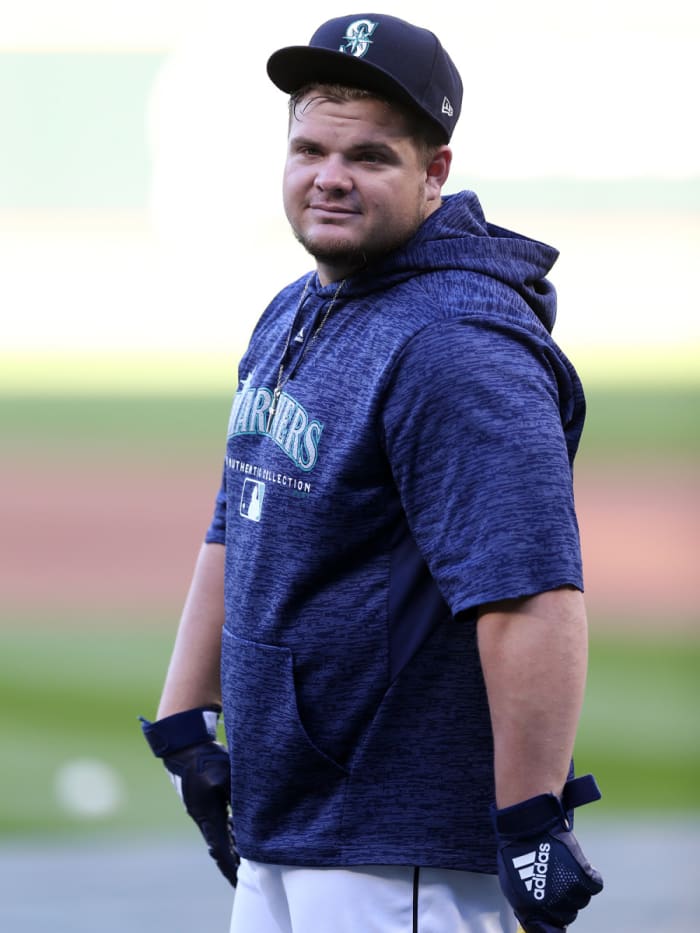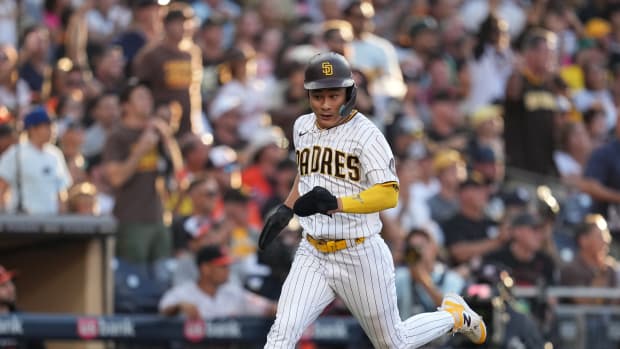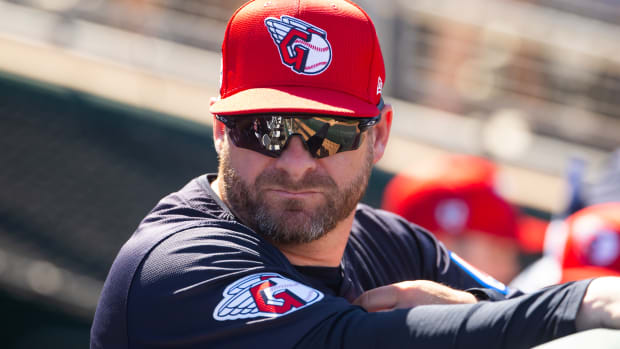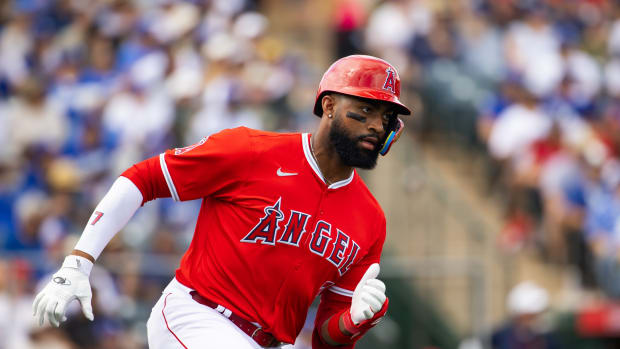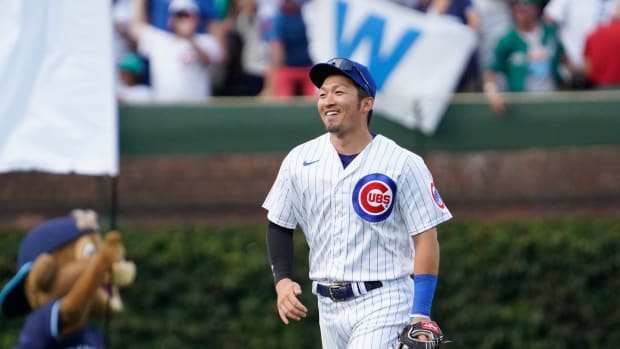How the Mariners Became the Best Team in Baseball
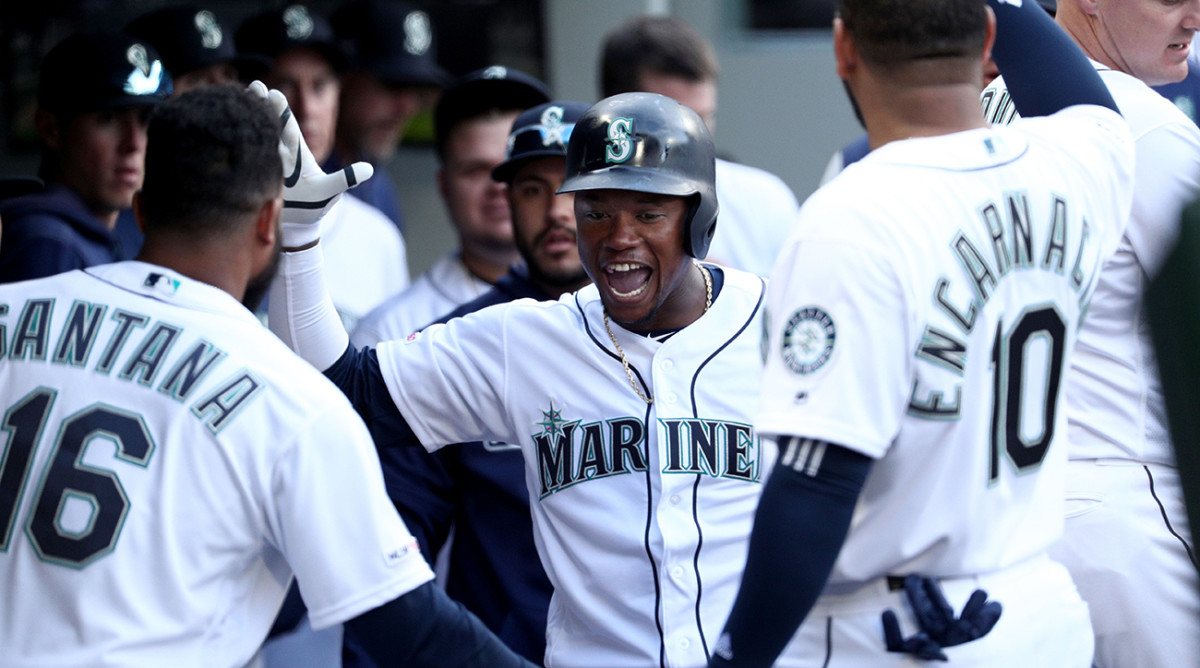
A funny thing happened for the Mariners on the way to a rebuild: They ended up as the best team in baseball—for now. With a come-from-behind victory on Thursday that finished a four-game sweep of the Royals, Seattle—yes, Seattle—has a six-game win streak, the majors’ top record at 13–2, and a four-game lead on Houston in the AL West. Not only that, but the M’s also boast the game’s most powerful offense: Through 15 games, they’ve blasted 36 homers and have a run differential of plus-42. The result is the best start for a team since last year’s Red Sox, who won 108 games and the World Series.
I imagine you have a lot of questions about this sudden spasm in the baseball universe. I’ll try my best to answer them.
I thought you said the Mariners were rebuilding. So aren’t they supposed to be bad?
They sure weren’t supposed to be good. Coming off an 89-win season that saw the team throw away a playoff spot with a second-half meltdown, general manager Jerry Dipoto decided it was time to move on from that particular core. Shipped out over the winter were James Paxton, Robinson Canó, Edwin Díaz, Jean Segura, and Mike Zunino; the team also said goodbye to Nelson Cruz, who left via free agency. That’s six of their top nine players in 2018 bWAR ditched, with Mitch Haniger (who led the team in that stat) as the only above-average threat left in the lineup.
The result of all that wheeling and dealing was seemingly not much. Díaz and Cano brought back two of the Mets’ better (yet far from the majors) prospects and Jay Bruce. Paxton returned the Yankees’ top pitching prospect in Justus Sheffield, but he had a rough 2018 and is in Triple A. Segura got Seattle the bad contract of Carlos Santana (which was quickly exchanged for the less bad contract of Edwin Encarnacion) and ex-Phillies No. 1 prospect J.P. Crawford, who didn’t make the team out of spring training.
Aside from splurging on Japanese lefty Yusei Kikuchi, the Mariners didn't make any noise in free agency. Their two biggest signings were former No. 1 pick Tim Beckham and No. 1 Bryce Harper hater Hunter Strickland. It’s the kind of winter best described as depressing, cheap and why bother playing the season.
You would have had a hard time convincing anyone that this team was going to challenge .500. FanGraphs agreed, pegging them preseason for 75 wins and a miniscule 2.3% chance at the playoffs. And yet here we are.
So why aren’t they bad?
It helps that the rebuild wasn’t a to-the-studs teardown. While plenty of good players were disposed of, useful parts remained, like Haniger, crafty lefties Wade LeBlanc and Marco Gonzales, Dee Gordon, and Ryon Healy. As for the major leaguers Dipoto acquired—Encarnacion, Bruce, Smith, and catcher Omar Narvaez (for reliever Alex Colome)—they may not be stars, but they’re at least average. Call it a soft rebuild, with the result being a team that, while not a contender, wasn’t going to be a 100-loss disaster like Miami or Baltimore.
Right, but being this good is out of nowhere.
It’s safe to say not even Dipoto in his wildest dreams figured the Mariners would be the 1927 Yankees reborn. Beckham hitting .386/.471/.773 with four homers, or Bruce already with seven dingers (while hitting .204!), or Encarnacion traveling back in time to kidnap his 2016 self and bring him to the present, or Gordon and Smith combining for as many home runs as Xander Bogaerts and Andrew Benintendi—those aren’t outcomes you could or should have counted on.
So what gives?
Some of this is simply a hot start, fortuitously happening all together. But sifting through the numbers, there are some changes worth noting. Beckham won’t hit like Peak Barry Bonds forever, but he is swinging and whiffing way less and making contact with a much higher launch angle and average exit velocity. Bruce, who battled a foot injury last year that sapped his power stroke, is healthy. Encarnacion has cut his strikeout rate a lot so far. As a whole, the Mariners’ lineup is more disciplined: Their walk rate has gone up three points from last year (7.1% to 10.1), and their outside-the-zone-swing percentage has dropped significantly (31.1% to 24.6).
It helps, too, that some of Seattle’s excellence has come via players with real pedigrees—chief among them Domingo Santana. Squeezed out of Milwaukee’s crowded outfield, he was landed for a song and has hit a gaudy .345/.424/.603 with four homers so far. Just 26 years old, he’s found gold and a real stud amid the mirages of Beckham, Bruce and Encarnacion.
But is there another big reason for Seattle’s success—maybe someone who is large and in charge?
Buddy, do I have the person for you.
Before this season, if you knew Dan Vogelbach, it’s because he was MLB’s resident Large Adult Son—a big burly lad who smashed dingers and had the build of a tugboat. But that portly stature masked a hitter who, while utterly useless with a glove and possessing the speed of a steamroller, absolutely mashed in the minors. Now, given an opportunity in the majors, he’s raking, hitting .423/.529/1.154 with six homers, including a game-tying blast on Wednesday. Like all the rest of the hot starts, that too will fade, but he’s a legitimate slugger and, at 26, a potential future piece for the Mariners to build on alongside Haniger and Santana.
But can the Mariners keep this up?
Oh my, no. Obviously, no team can keep winning games at a .866 pace—that’s 140 victories over a full season—but Seattle slumping to normalcy seems inevitable. While the offense is indeed raking, the pitching staff has struggled. Gonzales has been great, and Mike Leake has turned back the clock, but Kikuchi and LeBlanc have been middling, and Felix Hernandez continues to crumble into dust. The bullpen is in even worse shape: Strickland went down with an injury four games into the season, leaving manager Scott Servais to cycle through an uninspiring array of mediocre relievers in the late innings, to mixed success.
Most problematic, though, is the Mariners’ defense, which ranges anywhere from “bad” to “not recommended for children, the elderly or pregnant women.” Santana, Bruce, Encarnacion, Beckham, and Vogelbach are all butchers in the field, and Narvaez is one of the league’s weaker pitch framers behind the plate. Leads are going to be hard for Seattle to protect, and if the lineup slows down, the team’s going to be playing catch-up every night.
The Mariners’ schedule, meanwhile, has been toilet paper soft so far, with four games against a bizarrely awful Red Sox team, two against the mediocre Angels, and the last seven against the rebuilding White Sox and Royals. Things are quickly about to get turned up a notch with a three-game series against Houston, while May promises to be a doozy, featuring the Cubs, Indians, Yankees, Red Sox, A’s, and Twins. Add it all up, and you can understand why projection systems still don’t see this club as more than .500 fodder. Baseball Prospectus’ PECOTA pegs the M’s to finish with 81 wins; FanGraphs has them at 82 and with playoff odds of 15.1%.
But what if they can keep this up?
What’s fun to imagine is the universe where the Mariners just doesn’t stop winning, which raises the question: Should they go for broke? There’s one super-intriguing possibility in terms of two players who would immediately help fix Seattle’s biggest problems: Dallas Keuchel and Craig Kimbrel.
If Dipoto wants to ride this hot streak for as long as he can, then he’d be a fool not to make Keuchel and Kimbrel gigantic one-year offers to come to the Pacific Northwest. The Mariners' payroll is at just $151 million—a $10 million drop from 2018, and well shy of the luxury tax threshold. Even if you gave Keuchel and Kimbrel $20 million a piece, you’re still not cracking that dreaded (and relatively painless) limit. That pair would go a long way toward cementing the Mariners as more than two-week wonders.
But even if Dipoto stays put and the Mariners eventually deflate, they’ve at least provided more entertainment for fans than would’ve been reasonably expected in February. That should be its own reward: In a league where far too many teams no longer try, Seattle deserves credit for providing its fans with some bang for their buck, even if it happened by accident.
































